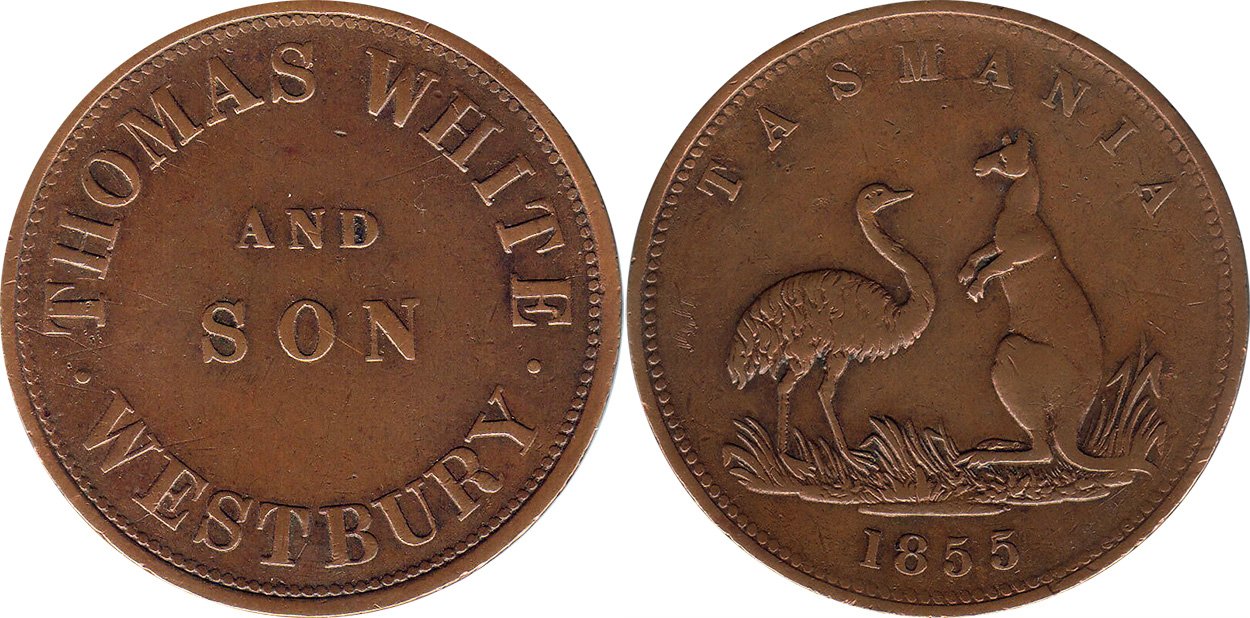Thomas White & Son, Grocers, Westbury, Tasmania
By Museums Victoria | Tuesday, 5 November 2019
The store from which Thomas White issued the White and Son tokens, the White House, is still located at the corner of Lonsdale Promenade and King Street in Westbury, Tasmania. McNeice's research found that he was living in Westbury as early as 1838, and that he founded his grocery business in 1845. A land grant giving the corner block to White is dated 4 November 1841. By 1855 the site was, according to Petterwood, 'known as White's Token Store when he had some penny and halfpenny tokens made.' (Petterwood). The tokens were struck for him by Heaton and Sons of Birmingham. He left the premises in 1859. The White House (as it is known) is now on the register of the National Trust of Australia as an outstanding colonial era building.
The Cornwall Chronicle (Launceston newspaper) for 4 April 1855 reported the establishment of a 'Patriotic fund' in Westbury on the second of that month, to show the 'admiration and gratitude the gallant conduct of their countrymen who have been engaged in the recent naval and military operations against the Russians, most cordially responds to Her Most Gracious Majesty's proposition of forming a Patriotic Fund for the relief of the widow and orphans [of men killed during the war].' A Mr White was one of the five committee members elected at the meeting, but it is not possilbe to guarantee that this was Thomas White. The conflict in question is now known as the Crimean War.
There was also a listing for a Thomas White and Son, Merchants and General Commission Agents, in Cameron Street, Launceston, in Walch's Tasmanian Almanac and Guide to Tasmania for 1867. As the name is so common, it is not possible to be certain that this is the same man.
A family history, written by Ethel St John, a decendent of Thomas White Jnr., provides additional details. Based on convict and other government records, it records White's time in Tasmania. In 1821 he was transported at the age of 19 after having been convicted of grand larceny in Suffolk. He was 5 feet, 2 1/2 inches tall, with light brown hair and blue eyes, and his occupation was given as 'seaboy'. His sentence was for seven years' transportation. During his first years in the colony White was reprimanded for being 'dirty and ragged' at muster on 5/6/1823, and fined five shillings for being drunk and disorderly in 1827 and 1830.
After completing his sentence White applied for a 'second class allotment' at Westbury and in 1832 he received 1 acre, 2 rods and 3 perches of land, and a second parcel of land the same size in 1841. White married Mary Berbin in Launceston on December 1, 1832. Berbin was transported to Tasmania on the convict ship Midas in 1825, and during her period of assigned service she was frequently in trouble, being charged with offences seven times. Her offences ranged from being absent from Muster to 'abusing Mrs Heavy' and 'admitting one of her Master's male servants to her bedroom and absconding from her Master's service'. Berbin was sent back to the factory four times during her time as a convict. Berbin is thought to have made two applications to marry. An earlier request, not thought to have been made in association with White, was refused. She was granted a conditional pardon on 22 August 1836 and a full pardon on 28 July 1839.
The 1833 census 'records Thomas White as the owner and occupier of a completed brick and wooden building in King Street'. He is classified as a 'shop keeper and other retailers'. The Whites 'became respectable citizens' at Westbury, and were active in the local Methodist congregation. Between 1837, when an application for land for a Methodist chapel at Westbury was made, and 1840 when it was completed, services were held at the White's home. The original Methodist chapel at Westbury was built for 150 pounds, and it seems reasonable to presume that the Whites were active participants in the process.
The 1847 census records that the White household included one married couple, one son, one free servant, male, and one convict servant. Thomas and Mary had no children of their own, but adopted a son, who they named Thomas. The only information about his birth comes from his marriage and death certificates, which state that he was born in 1828 at Westbury.
From the description of the property at the time of Thomas Jnr,'s wedding to Mary Burrill in 1853, it seems that this couple of former convicts had prospered in their business. According to St. John, '...the buildings at Westbury now consisted of the store with original dwelling above and at back, a large bake house that had been the original home, a commodious coach house and very adequate stone stables.'
According to the family history, the Whites were generous with the credit they gave. When a ship carrying an uninsured shipment of goods from England sank en route to Tasmania, it took the White's prosperity with them. The family lost their store. Thomas and Mary Senior stayed in the Launceston area, where Thomas died in 1866. There is no record of Mary's death. Their son, his wife and their four children moved to Bairnsdale where he opened a grocery store on the corner of Main and Service streets.
White's tokens were struck for him by the Heaton and Sons mint, Birmingham in 1855.




